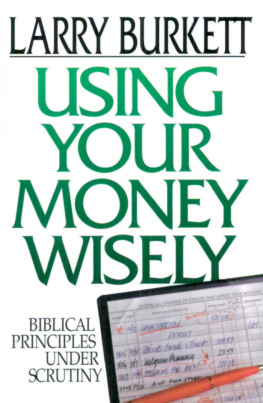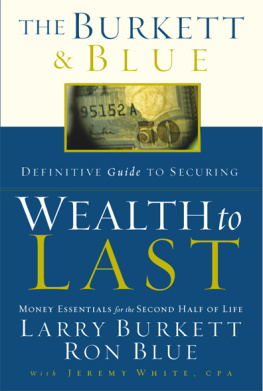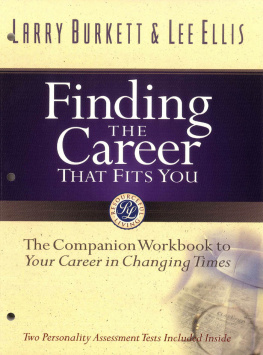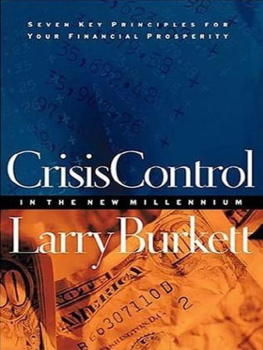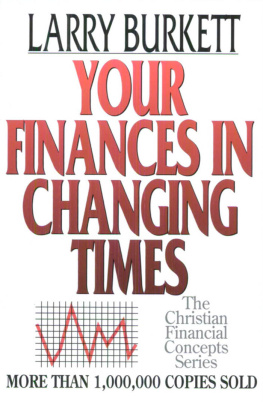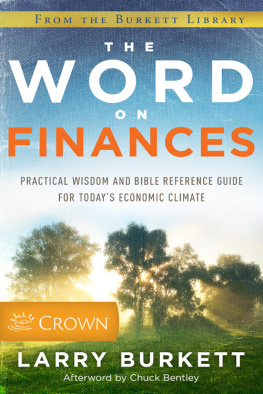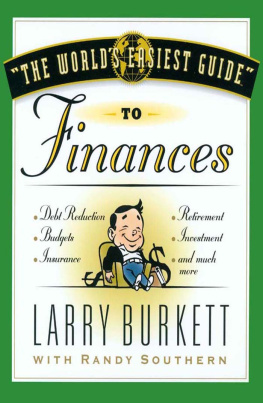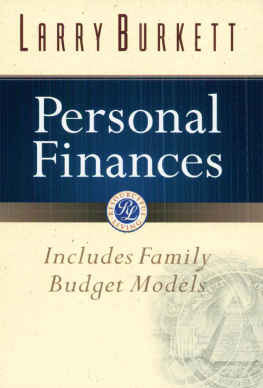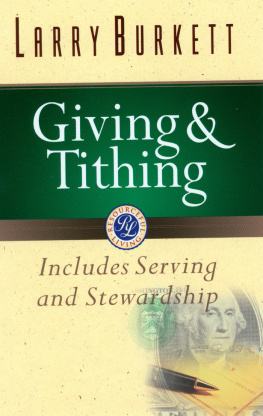USING
YOUR
MONEY
WISELY
USING
YOUR
MONEY
WISELY
LARRY BURKETT
MOODY PRESS
CHICAGO
1985 by
C HRISTIAN F INANCIAL C ONCEPTS
Moody Press Trade Paper Edition, 1990
Original title: Principles Under Scrutiny
All rights reserved. No part of this book may be reproduced in any form without permission in writing from the publisher, except in the case of brief quotations embodied in critical articles or reviews.
All Scripture quotations in this book are from the New American Standard Bible, 1960, 1962, 1963, 1968, 1971, 1972, 1973, 1975, and 1977 by The Lockman Foundation, and are used by permission.
Christian Financial Concepts, Inc., is a nonprofit, nondenominational ministry dedicated to teaching Gods principles of finances. CFC offers teaching and training materials in the area of finances for youth, family, business, and education. All materials are available in video, audio, and written format.
Library of Congress Cataloging in Publication Data
Burkett, Larry.
Using your money wisely.
Rev. ed. of: Principles under scrutiny. c1985.
1. Stewardship, Christian.2. Finance, Personal
I. Burkett, Larry. Principles under scrutiny.
II. Title.
BV772.B79 1986 332.0242 86-8664
ISBN 0-8024-3425-8 (pbk.)
17 19 20 18
Printed in the Unites States of America
My wife, Judy, and I dedicate this book
to the supporters of Christian Financial Concepts, who make this work possible.
Contents
Preface
Dear Christian friends,
Finances are an integral part of daily living today and can affect us either positively or negatively. Through His Word, God gave us specific guidelines to direct our lives so that we can enjoy the blessings He promises us. There are more than sixteen hundred verses in the Bible that deal directly with financial situations. Only love is discussed more often than money in the New Testament, which says something about the importance of finances.
Using Your Money Wisely presents the financial principles found in the Bible and applies them to daily life in the home, business, and church. These simple principles will forever change the way you think about finances. I pray they will be used as a guide for making financial decisions in accordance with Gods Word.
Because of Christ,
Larry Burkett
M any of the decisions that Gods people make on a day-by-day basis are motivated not by trust in God but rather by fear of the future. That is most often true with financial decisions. For example, many people stay with jobs they fear changing. That is particularly true with those who are forty and older. Society has convinced us to large degree that those over forty are past their prime. That is nonsense and runs totally contrary to Gods intention.
Fear of the future causes Christian families to scrimp and sacrifice for retirement. Often the total focus of the earlier years is toward the eventful day when we can relax and really enjoy ourselves. Unfortunately, the same fear that necessitated the hoarding for the latter years then forces further sacrifices just in case.
I dont mean to imply that some planning is not Gods will; obviously it is. But when a Christian looks inside and finds primary attitudes of fear and worry, bondage has occurred.
WOULD A MAN ROB GOD?
Many families literally rob God and their families because of that underlying fear. They start a savings or insurance plan initially with an eye toward family provision but then more contingencies must be provided for. Finally there are so many contingencies that no amount of protection is adequate, and fear pervades all decisions about money. Some are willing to give a tithe from regular income, but any invasion of their surplus prompts resentment and alarm.
The net result of this life-style is bitterness, conflict within the family, and growing separation from God.
My heartfelt concern for this spiritual illness is that it is increasing among dedicated believers and is being rationalized as good planning for the future. That is an absolute lie. Any action that is not done from faith is done from sin (Romans 14:23). The growing mania for buffering ourselves against any possible future event is straight from the deceiver. When our sand castle of affluence comes tumbling downand it willour faith had better be founded in the person of Jesus Christ and not in material security (Matthew 7:24-27).
FAITH CONQUERS FEAR
The opposite of fear is faith. Therefore, when dealing with fear, one must first understand faith. In Hebrews, faith is described as things that we hope for and things that we do not presently have. Therefore, if we have no needs, we have no need of faith.
It is Gods plan that we have some needs in order that we may develop faith in Him. It is vital that we view these future needs as opportunities to exercise and develop our faith.
In Hebrews 11:6 we are told that God is a a rewarder of those who seek Him. Each Christian must decide, Do I really believe that? No Christian can truly serve God and live in fear. Christ says that it is a black-and-white choice: either you choose to serve God or you choose to serve money (Matthew 6:24).
CAN YOU REALLY TRUST GOD?
We live in a materialistic generation. Priorities are established based on desires, not needs. That is not limited to unbelievers. When we see how much confidence other Christians place in money, including those in the pastorate, its easy to lose sight of the mark. Problems seem to erode our faith when it seems that some who truly trust God suffer financially and physically. Finally, we yield to the impulse and get caught up in the mad rush to protect against the future. We are guilty of attempting to counsel God rather than accepting His counsel.
We will never know with certainty why God allows problems to come into the lives of some godly people. But we can look back upon the lives of the apostles and see that God allowed them to suffer for their maturity and His glory.
Have you ever asked God for something and when it didnt happen you thought God had failed you? Isnt it strange that we usually expect Gods answer to be a yes rather than a no? There are many reasons why God would not respond the way we desire:
- We ask with the wrong motives (James 4:3).
- It is the wrong time according to Gods plan (Luke 11:3-10).
- It is contrary to Gods greater plan (Acts 21:13-14).
- We are here to serve God, not for God to serve us (Job 41:11).
HOW TO TRUST GOD
1. Find Gods direction for YOUR life. Most of the frustrations experienced by Christians come as the result of patterning their lives after someone elses. Even the most devout believer can drift off of Gods path by trying to match assets with another. Remember that Gods successes are not graded by accumulated savings.
Accept Gods provision as His plan for your life, and find contentment in the source rather than the supply (1 Timothy 6:7-8).
2. Make a conscious act of trusting God. The method of doing that will vary from family to family. For one, it will mean actually withdrawing some of their stored resource and sharing it as God directs them. For another, it means taking the step of faith to leave that fruitless job. For another it may mean being content without that new, bigger home. The ways to practice putting our faith into motion are as different as Gods plan for each of us. I would challenge you to find a way to express your faith through a material commitment.

